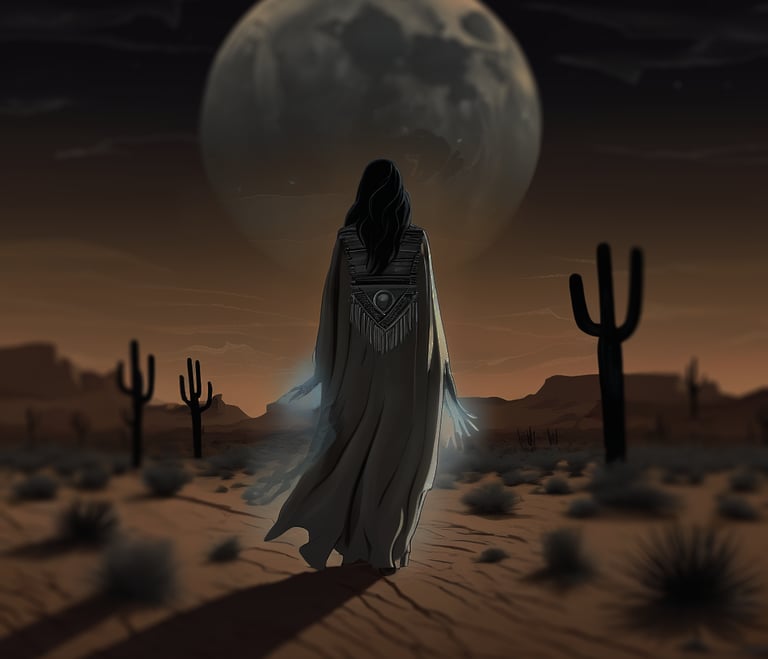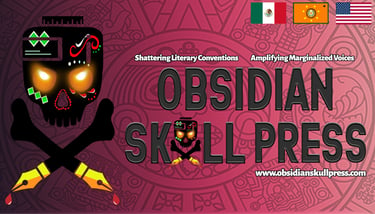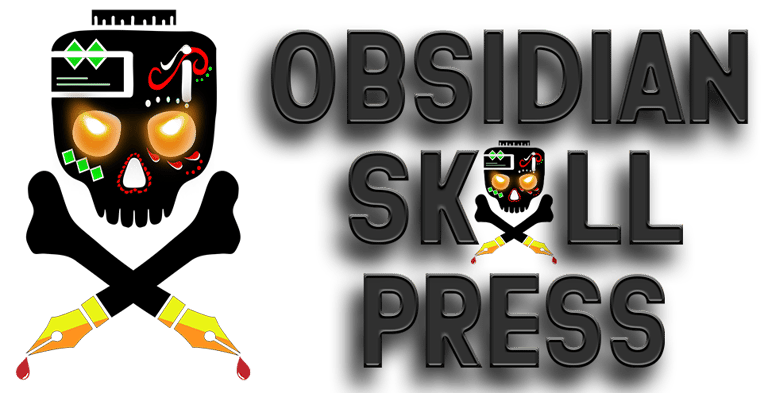WAHUCHILI
Andrés struggles with his grief and guilt over the loss of Nascha, a beautiful spirit who urges him to fight for her but realizes that his refusal to let go is harming both of them. As he reflects on their past together, he acknowledges the distortions time brings to memories and the burden of his pain. In a moment of clarity, he visits her grave and performs a sacred ritual to sever the emotional ties that bind him to his sorrow, allowing Nascha’s spirit to find peace. He embraces the importance of celebrating her life rather than mourning her death, ultimately seeking to reclaim his own joy.
TL Hutton
3/30/202512 min read
…For here is where she now is… The apparition’s words resonated within Andrés’ mind. She needs you. She awaits you. She fights for you. Do not cease to fight for her…
But Andrés knew that fight no longer coursed within his veins.
To the dirge’s rhythm of burning-cold agonies that pulsed with each fleeting beat of his heart, it seeped from the stigma borne of his wrists, formed viscous crimson pools dyed black as his sins in the wan lighting, congealing with each oozing inch across the cold flagstone floor, the vorpal putas wink of hand-knapped obsidian flirting with his eye from its copper-flecked shoals, as if to say, Hope it was as good for you as it was for me…
“But you must, Andrés.” A distinct Sonoran accent rode upon Nascha’s words – a melody of Spanish tonemes, shortened singsong pitching of vowels, and an alteration of syllabic stressing one could only hear in Yoeme, the Uto-Aztecan language of the Yaqui. Despite the Purgitorio’s calm of a starless desert’s night, the turquoise and gold jeweled gossamer train of her strapless snow-white buckskin wedding gown ebbed and flowed in spectral fluidity about her petite frame.
In life, she’d been an Angel; beautiful, radiant, and glowing - a semblance of perfection that only a handful of artists, or the gods, could so masterfully carve. In death her beauty still held true, only her radiance, her ebullient glow, had ebbed over the years, leaving within its wake a perpetual morosity.
And it pained Andrés to witness her spirit’s fleeting; the gnashing teeth of duty, of responsibility, gnawed at his entrails.
Time distorted everything. Especially memories: The once familiar lines of a loved one’s face; the scents of their flesh; the sublime tenor of their voice; the kinetic charging of ions from their touch alone. Time distorted everything and these little details were just as quick to dissipate as the hourglass sands.
Perhaps his memories of her - of their - Midian refuge, was fading. A synaptic struggle of holding onto the little, yet vital details?
Defiant - more in lieu of his own grievous infidelity than that of her plea – Andrés maintained his resolve. “Yo-Yo no puedo. I will not.”
“Look,” the slender wisp of her arm – wrist wrapped in colorful wampum beads that chimed with the movement and a leather band adorned with shimmering jewels and feathers tight around her bicep – her arm swept about a milieu deserving of the Brothers Grim quill pen.
Like arthritic fingers reaching up from their graves, wraiths of mesquite and palo verde trees and dirty desert scrub loomed over burial mounds marked with wooden crucifixes of leatherbound twigs and hand-chiseled rocks dotted with a handful of contemporary headstones that bore witness to the passage of time. Knotted and gnarled, their visages glowered within the shadows, a dour reflection of the Hamadryads' souls within. Surrounded by an adobe wall whose once colorful murals were now peeling and leprous, a statue of Santa Muerte, the Lady of Death, stood sentinel at one end of the cemetery, while a statue of the Lady of Guadalupe, the protector of the downtrodden and oppressed, stood at the other. Cracked and crumbling, their features honed all but smooth by the elements' rough caress throughout time immemorial, a reflection of their failure to watch over the graves of the dead and guard them from the pasko’olas, malevolent spirits seeking to disturb them in the lull of their slumber. The adobe mission, its deep arched windows once luminous with the fluxing yellow-orange glow of candles, where the lives of so many had both begun and ended, lay in ruin - crumbling adobe walls, broken terra cotta tiles, and rotting timbers - begging to take its final breath.
“Huenúkiahta yokosiin? Do you not see? Can you not feel what is happening?” Masked in a stripe of crimson clay paint that traversed her face, her eyes - big and bright, sparkling with the vivacity of polished onyx in contrast to her phantasmal sublimation - plead with his perpetually sad browns.
Once grounds of hope, of unions blessed by Achai O’ola, Father Old Man of the Yaqui, where those lain within that sacred earth were not mourned in death but celebrated for the life they lived, it was now a place of Despair. Of loneliness and death. Of ebbing memories and lost dreams. Not but a shadow of the life it once boasted.
Life itself is but the shadow of death, and souls departed but the shadows of the living. He thought, the words of Thomas Paine; a hot, sensual, whispered breath in his ear, borne of Nascha’ lips decades prior on that day she’d first shown him this sacred, once beautiful acre. That day they had joined together as one heart, one soul, one mind, stopping not for the world, but making the world stop for them.
Andrés swallowed hard, choking down a knot of bleak truth that had lodged itself within his throat. He could summon no justification to contend with her argument; here was a palpable sense of loss and decay about a land he no longer recognized, as if the very earth itself had been abandoned by the gods and left to wither away.
And his holding on to her, his refusal to let go even after all the cold, dark, and lonely years, was killing her. Killing their Midian plot of refuge. Killing the memories. And in such, so was he again losing Nascha in death just as he had lost her in life.
He had known this for years, watched it progress, bearing witness as her spirit’s ebullient glow – as well as other traits that defined Nascha’s loving candor - had slowly begun to fade, turn blue to gray just as the days long ago had.
It was enough to render the strongest of hearts and minds feeble. Or downright stubborn. Human Condition did dictate on a general rule that man was hard-wired to be in absolute denial of anything bad about those things he loved the most.
“I-I do. And…and I wish –“ platinum moonlight glistened upon welling tears, made the copper-flecked shoals of his sad browns glisten like black ice. He reined in their flow with a growl that twisted the features of his face into an ugly mask of anger. “Maldita sea, Nascha, do I wish that I could forget how to see, how to feel. I-I never asked for any of this. It- it is a curse that was forced upon me.”
Just as she had moved in life, so did her spirit canter with a like grace in death. Through lingering cemetery mists she glissaded, waist-length obsidian locks – adorned with vibrantly colored beaded and feathered braids - and the shimmering gossamer of her traditional buckskin gown’s train flowing in lambent fluidity. Her long fingers brushed over weathered headstones and decaying wooden crosses; an unspoken acknowledgement, comforting of those weary souls whose epitaphs no longer bore their names. Beneath the saddened arms of a saguaro rent with fissures, the sagacious Signum Panthea of one of the many saints interwoven into Yaqui and Mexicano culture he did not recognize, wept - falling, they were tears; having fallen, blood - as she passed by.
“Oh, Andrés …my sweet writer; my Shakespeare…”
Gliding past her own ruinous burial mound, she was suddenly before him, a wisp of delicate hand - glimmer of the engagement ring he had laid her to eternal rest with two decades prior catching his eye - tracing the hardened, weary lines of his face. Her touch, her very caress, cold as the worm-riddled decomposing earth in which her physical-self laid; an opposite of the warmth she’d permeated in life.
“You have always seen the world through eyes different than most, felt on a level that most shall never experience; it is this that makes you so special. And that torments you so.
“Yet you do not see all that you need to see; you misunderstand your gift. And in misunderstanding it, do you fear it. It is the majairi, the fear, my Waata, which torments you, not the gift.”
“I-” Andrés steeled himself, reined in the burning torrent of sobs he felt welling. “I am tormented because you left me incomplete. I am tormented because I am a-alone, because I shall always be alone. I am tormented because I have tired of fighting for love - for the love of a nameless face I have only seen within my dreams - while love refuses to fight for me in return.”
“That is not true: Never have I left you, nor shall I ever.” The wampum beads – bracelets made of seashells, made faint clashing sounds meant to represent thunder as her palm came to rest upon his chest, above his heart; it was creepy not feeling a pulse within a touch that had once coursed with such life. She will find you. When Achai O’ola decides the time is right, she will find you. For here is where she now lies. She needs you. She awaits you. She fights for you. Do not cease to fight for her.” A single tear, sparkling quicksilver in the wan moonlight, rolled down the arc of her cheek. As had been her sentiment in life - and no less endearing in death - she kissed him upon the brow, between his eyes. “It has always been about her. Please, Andrés, let me go.”
“I – Nascha,” he sighed, cast his eyes to the withering wisps of desert vegetation at his feet.
“Aposhiya hapaahcata yaatam.” Nascha said in her melodic native tongue and then in English; even in death her spirit knew he struggled with the Yoeme tongue, despite his being well-versed in Classic Nahuatl. “You have my blessing.”
“I have no fight left. None. All I fight for, it – La Oscuridad – rises from the shadows with its dark claws and reaps that which I so errantly seek – Mi padre, mis hermanas, tú mismo - so many others. For me to fight for love, for life – for any but my own, is to bring heartache and death upon any but myself. It’s - It is both a selfish notion and act on my part. Too much innocent blood stains my hands as result of this curse already.”
“Andrés, you - you must, you cannot -“ the elegant lines of her face twisted into a mask of rage, an inhuman rage born of something far darker than any human rage, shimmering onyx eyes suddenly cast in a fathomless obsidian, viscid as oil, as sin, as the charnel halls of his ancestors Mictlan, holding a wavering image of his own horrified face within their depths.
“WHEN WILL YOU SEE? WHEN WILL YOU OPEN YOUR EYES? THERE IS A GREATER PURPOSE IN YOUR PAIN AND YOUR GIFT – YET YOU ARE TOO GODDAMNED COWARDLY AND WEAK TO SEE IT!” Nascha’s fantasma roared, tiny hand squeezing so hard upon the arm of an old hand-carved limestone crucifix bearing the date 1732 on its weathered face, that it shattered in a cloud of white dust and pulped debris.
Andrés scrambled backwards, tripped over his own feet – and landed hard upon the cold desert grit, taken back, pained at her sudden unprovoked attack as if her words had taken on physical properties and CRACKED! him upside the head with the numbing, blood spattering results of a Jaguar Warrior’s Macahuitl spilling Conquistador brains in tribute to Quetzalcoatl.
“QUÉ DIABLOS – what the Hell is wrong with you?!” He shouted back at her ghost, casting his best “Vete a la mierda” glower he could wield in lieu of his heart literally exploding within its cavity.
It was getting worse, as the years progressed. Her anger. Her rage. It was almost as if …no – there was no fucking way! Fantasmas were just that: Fantasma. An ephemeral reflection of the life they once held. The rules were different for them; they couldn’t suffer the mental and emotional travails born of the flesh any longer.
Nascha’s face suddenly softened, again that Angel cast at the masterful hands of the gods; her eyes, beautiful shimmering onyx depths rather than the fathomless pits of demons, suddenly widened, scoured the ruinous milieu of burial mounds and weeping saints, of untended grounds and forgotten souls. “Wahuchíli comes for you, my love!” She warned, a frightened whisper poignant in its urgency, dissipating before his eyes like the final lingering image of a fading dream. “Do not lose yourself to His cold embrace…”
5 Months Later
"I-” Andrés swallowed, unable to find the words the cord of woven yucca fibers bound around his neck making the effort uncomfortable.
He wanted a cigarette, but he refused to smoke here, on this earth. Sacred ground. Maybe if he had a tobacco plug or a peyote button to offer the spirits, yes, but not a filtered cigarette. That would be disrespectful and if there was one thing he honored more than any other it was the Viejas Tradiciones. The old ways of both Nascha’s and his people.
He looked away, allowing his sad browns to drift over the Midian plots.
While some were nothing more than burial mounds rising from the dirty desert grit between the sinews of mesquite and palo verde trees or the outstretched arms of a sentinel saguaro, others were bordered by colorfully painted stones or marked by white-painted concrete slabs, the gravesites told their stories through the tributes and personal possessions left by loved ones. Bursting with vibrant colored flowers and hand-painted murals – Jesus and the Lady of Guadalupe here, Santa Muerte and Saint Paul there - along the cinderblock walls that surrounded the cemetery, hand carved crucifixes and crosses twined together from twigs and a handful of granite headstones searched the deepest, darkest recesses of his being.
And – though he knew that they wouldn’t just BOOO! jump out and reveal themselves, he could still feel their sentience; an unearthly frore that was a few degrees colder than the chill desert twilight – Andrés suspected that a handful of the graves’ tenants were doing that just.
Because that was what the dead did whenever the living intruded upon the sanctity of their domain: They sized you up.
Not that the cold necrotic scrutiny of the dirty desert dead served as the catalyst of his present unease. It was the voyeurism of the living which brought him pause. This was a private moment for Andrés. A personal moment. And in such a very vulnerable moment. No prying eyes harbored the authority, nor reserved the right, to steal that from him.
Andrés drew a deep breath of cold air into his lungs, a shiver racking his chiseled frame as it filled his lungs and reigned his sad browns back from their vagabond’s musing, summoning his courage.
"I apologize that it has been so long since my last visit, mí amor," he finally breathed. Not but icy clouds that drifted away to whatever oratory Perdition words went when there were no ears to hear their tell. "A lot has happened, but... Well, we both know I'm not here to give an oral peroration of the past months."
He paused, looked down at the traditional Yaqui burial mound at his feet, as if waiting for an answer. Not that he expected an answer. Hell, he had never expected an answer. Not during his last visit in those dark days before deciding to take his own life and not now. Not as he did from the other graves that surrounded him in a sea of stone and wood and flowers and sun-faded paint and candles and dirty desert grit. Because he had never felt it there, that sentience, that presence. What the ancient Greeks so elegantly nicknamed Anima Humana.
And now he understood why. The dead could die again. A selfish result of the human condition in not letting them go. Denying them their peace in damning them to an existence within those shadows between life and death.
“The truth about people.” He began, “is that we are, by nature alone, stubborn, emotional creatures. As a result, we allow ourselves in the instance of death, a funeral, be governed by emotions alone. We mourn over our dearly departed in fits of seemingly endless weeping and falling tears or bouts of uncontrollable rage as the body is slowly lowered into its earthen sepultura; we fall prey to that dark cathartic wave of depression, of disbelief, detaching ourselves from the vital comforts of familia y amigos - and reality - so consumed by that antagonist of grief we become. We even, in those most extreme cases, elect to join the dearly departed, convincing ourselves that we cannot live without them, through such selfish means as taking our own life.”
He let out a solemn sigh, retrieving something wrapped in deerskin from his pocket. Kneeling beside the burial mound, he placed his hand upon its foot. " Such as I did.”
Andrés struggled to find the right words. "Te extraño. Te amo. Nunca te olvidaré. I... I am sorry for the pain I have caused you in my grief. Like the Ferryman Charon who denies passage to souls across the River Styx, I have denied you your peace in death."
Bowing down, he untied the leather strap that bound the buckskin wrapping. Within it, Sol's pewter-yellow eye gleamed off the cold obsidian of an ancestral blade, it’s knapped edge still bore the thick stain of his own selfishness from months past, its gold serpent-headed hilt wrapped in dried human entrails and leather bands.
“You have always been the Virgil to my Dante, mi Corazón," he whispered. "You taught me that the departed seek only remembrance, to not fade into oblivion, to know that their lives held significance."
Slowly, he slipped the blade beneath the woven cord of yucca fibers that he had bound around his neck; an all-night ritual of Nascha’s people known as Lutu Pahko, or Cord Ceremony. With a swift motion, he severed the cord as the sun’s molten eye began to peer out over the distant razorbacks of black mountains, an act known as Lutu Chuktiwa, or Cutting the Cord.
Placing the severed cord at the foot of the burial mound - the final act of release, a symbolic farewell that released the family and community from mourning - Andrés, unbelieving, watched as the plants fibers were suddenly engulfed in flames, as if touched by the stretching fiery appendages of the sun. As the smoke rose into the dawn, carrying his regrets and sorrow, he whispered his farewell in classic Nahuatl, of the same Uto-Aztecan family of Nascha’s native Yoeme tongue, "Ipalnemohuani in nel neltiliztli, tlen aikpa tlalticpac, tlen mocemili." ("I will no longer mourn your death but celebrate your life and accept my gift.") he let go of her spirit, allowing her to find her peace within death and his own in life.
III.
II.
I.
TL Hutton
July 30, 2024
Phoenix, AZ


Nahualli by TL Hutton 2023 Illustration & Photo Manipulation
© 2025 TL Hutton | Obsidian Skull Press. All Rights Reserved


Follow us
Causes we Support













